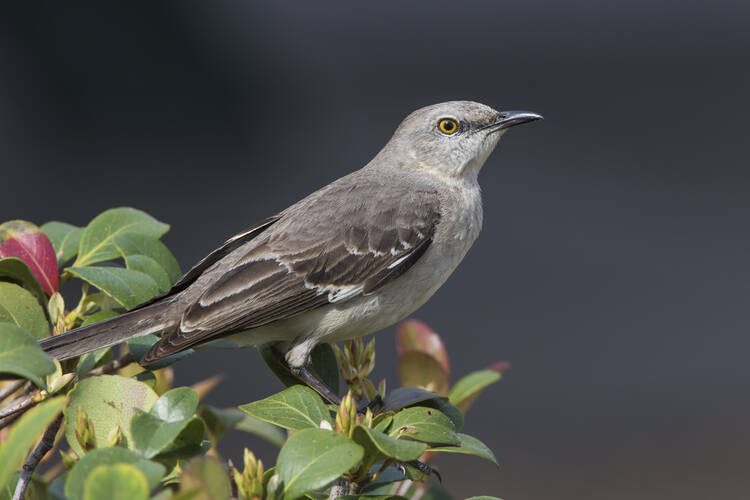As long as I have lived here, almost 30 years now, a mockingbird has arrived every spring and stayed until the approach of winter. Year after year his instinct tells him this place is home. Having read that the females rarely sing in summer, I think this bird is a male. And since the oldest known mockingbird lived only to age 14, I realize that the same bird has not been stopping by for decades. Still, I like to think of the current songbird as the son or grandson of the mockingbird I first listened to with such pleasure.
You can’t miss a bird that chooses the highest tree branch as his stage. Often that stage is on a green ash that grows 100 feet from my bedroom window or a tall blue spruce planted in the cemetery behind our rectory. Another favorite perch is a 15-foot Celtic cross, carved from granite, that overlooks a grassy circle at the cemetery entrance. On many evenings I walk through the cemetery or sit on a bench to hear the mockingbird’s serenades. His repertoire includes long-lasting arias and an occasional midnight performance.
The mockingbird uses so many different calls I have stopped trying to count them. Bird experts can tell where a particular mockingbird has been by identifying the region where the birds live whose song is being repeated. Repeated, yes. But mocked? I think the mockingbird has been misnamed. Rather than “mocking” other birds, maybe he has found something beautiful, pleasant or interesting in their songs that he cannot help but share. The mockingbird I hear shares many songs with this parish on the eastern end of Long Island. His free concerts cause me to reflect.
Two long-gone pastors from this town lie buried beneath the bird’s Celtic-cross podium. One pastor served Irish immigrants who came to work here and eventually bought parcels of rich, Long Island farmland where they settled. The other pastor ministered to a parish half a mile away where Polish immigrants, who arrived 30 years later, also cared for the land. While they lived, these Polish and Irish parishioners sang life songs of their own. Some were likely long-lasting arias, others midnight performances. Those life songs traversed time, lilted across generations. They are still being sung by Polish and Irish descendants in this town and in these churches. At the cemetery, I hear the mockingbird broadcast his melodies over their graves and the graves of other people from many lands.
The mockingbird, who remembers where he has been and what he has heard, enriches others with songs that have have become a part of his life. He is one of nature’s reminders, telling us over and over who we are as daughters and sons of God. We, too, are called to recognize the songs of others—the truth, beauty and wisdom in their lives. We are to make those gifts part of our lives and to share them widely. St. Paul writes (1 Cor 12) that all the baptized make up the many members of the one body of Christ. Through that body God continually touches our world, heals it, forgives it, redeems it and brings it peace. Recast with respect to the mockingbird, one could put it this way: We are all called to join the chorus, while God sings to our world through Christ and all creation.








